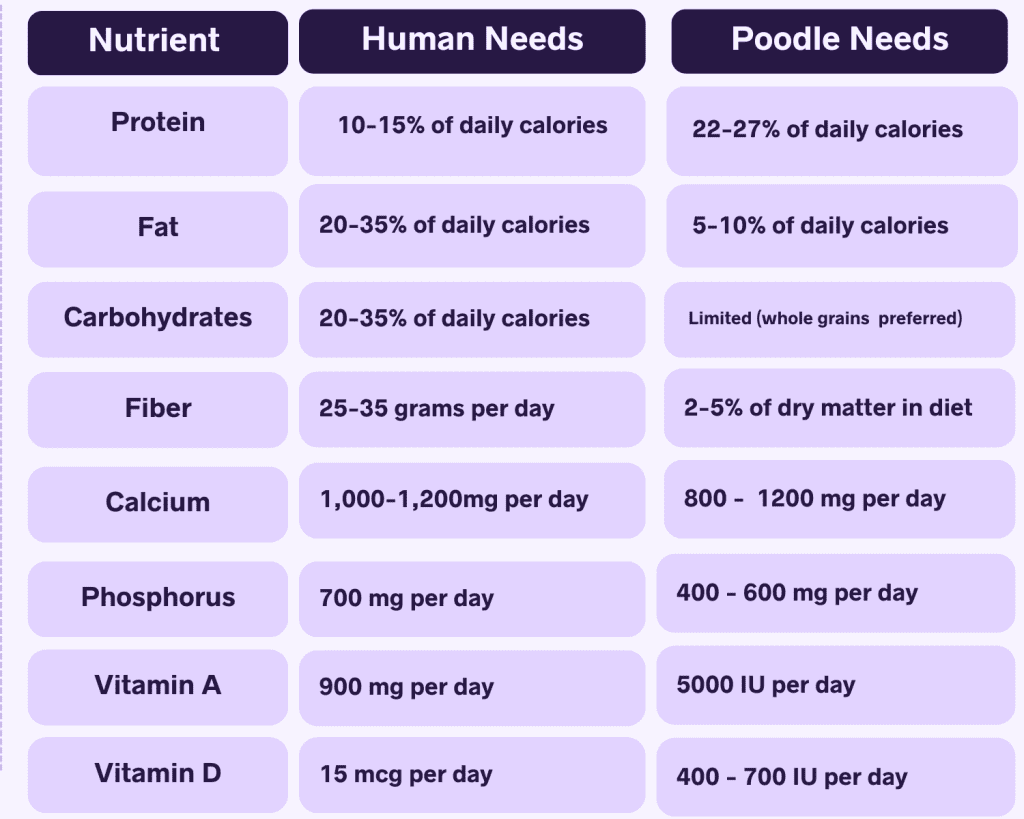Hey there Poodle owners! Poodle Food & Nutrition Guide helps you understand a poodle’s nutritional needs are crucial for ensuring their health and longevity. While poodles are omnivores, their dietary requirements differ significantly from ours. This comprehensive guide explores what poodles need, safe human foods to share, and potential dangers to avoid.
Poodle Food & Nutrition Guide
Understanding Poodle Nutrition
Protein: As the building block of muscle, poodles require higher protein levels than humans. Adult poodles need at least 22% protein, while puppies require 27% for proper growth and development.
High-quality dog food formulated for poodles typically meets these protein requirements.
Fat: Providing energy and aiding in vitamin absorption, fat is essential but needs moderation. Aim for 5-8% fat for adults and 8-10% for puppies. Choose lean protein sources and avoid fatty foods like fried chicken and bacon to prevent obesity and pancreatitis.
Carbohydrates: Unlike humans, poodles don’t need high levels of carbs. Excessive carbohydrates can contribute to weight gain and allergies.
Opt for dog food with limited refined carbohydrates like corn, wheat, and soy. Prioritize whole grains like brown rice and oats for their nutritional benefits.
Vitamins and Minerals: Poodles require various vitamins and minerals for optimal health, including vitamins A, B complex, C, D, E, and minerals like calcium, phosphorus, and potassium. A well-balanced dog food formulated for poodles should provide these essential nutrients.


Safe Fruits and Vegetables for Poodles

Apples
Benefits: Rich in fiber and vitamins A and C, which are essential for boosting the immune system and supporting healthy skin and coat.
Preparation: Wash and remove the core and seeds before serving. Seeds and cyanide, which is toxic to dogs.
Serving size: Offer small pieces occasionally as a treat.
Bananas
Benefits: Good source of potassium and vitamin B6, important for muscle function and nervous system health.
Preparation: Peel and offer small slices as a treat.
Serving size: Limit intake due to high sugar content.

Blueberries
Benefits: Packed with antioxidants, which help fight free radical damage and promote overall health.
Preparation: No preparation is needed, serve whole.
Serving size: Offer a handful as a healthy treat.
Cantaloupe
Benefits: High in water content and vitamin A, promoting hydration and healthy skin and vision.
Preparation: Wash and remove the rind and seeds before serving.
Serving size: Offer small chunks as a refreshing snack.
Strawberries
Benefits: Rich in vitamin C and fiber, supporting immune health and digestion.
Preparation: Wash and offer whole or sliced.
Serving size: Offer a few berries occasionally due to high sugar content.

Broccoli (cooked)
Benefits: Excellent source of vitamins C and K, supporting bone health and immune function.
Preparation: Steam or lightly boil until tender.
Serving size: Offer small florets occasionally.
Carrots
Benefits: Rich in beta-carotene, which converts to vitamin A in the body and supports healthy vision.
Preparation: Serve raw or cooked.
Serving size: Offer sticks or slices as a healthy treat.
Green Beans
Benefits: Good source of fiber and vitamins A and K, promoting gut health and bone strength.
Preparation: Steam or boil until tender.
Serving size: Offer green beans as a healthy snack.

Peas
Benefits: Excellent source of protein, fiber, and vitamins A, C, and K.
Preparation: Serve fresh or frozen (thawed).
Serving size: Offer a handful of peas as a healthy treat.
Spinach (cooked)
Benefits: Rich in vitamins A, C, and K, as well as iron and folate, essential for good health.
Preparation: Steam or lightly boil until wilted.
Serving size: Offer small amounts due to high oxalate content.

Few Pointers
Introduce new fruits and vegetables gradually and monitor for any digestive upset.
Wash all fruits and vegetables thoroughly before serving.
Remove seeds, pits, and cores from fruits before serving, as they can be choking hazards.
Moderation is key, even with safe fruits and vegetables. They should be offered as occasional treats, not as a replacement for their regular dog food.
Consult your veterinarian if you have any concerns about feeding your poodle fruits and vegetables.

Foods in Moderation

Cashews and Almonds
Benefits: Excellent source of healthy fats, protein, and fiber.
Preparation: Offer small, chopped pieces. Whole nuts can be choking hazards.
Serving size: Monitor your poodle closely and offer only a few pieces as a treat due to hiits gh fat content.
Important notes: Do not offer salted or seasoned nuts.
Tomatoes (remove green parts)
Benefits: Rich in vitamin C and antioxidants, beneficial for immune health.
Preparation: Remove the green parts (stem, leaves, and green flesh) as they are toxic to dogs. Dice or slice the ripe red part.
Serving size: Offer small amounts as an occasional treat.
Important notes: Avoid offering unripe tomatoes or large quantities.

Ice cream (avoid sugar-free varieties)
A small amount of ice cream can be a refreshing treat on hot days. Choose plain ice cream without artificial sweeteners or sugar substitutes. Xylitol, a common sugar substitute, is highly toxic to dogs. Offer a tiny spoonful as a rare treat.
Important notes: High sugar content can lead to digestive upset and weight gain. Limit intake and monitor your poodle’s reaction.
Salt (minimal amounts)
Essential for maintaining proper electrolyte balance. Limit salt intake. Do not offer salted snacks, table scraps, or your food. A tiny pinch of salt on their food occasionally is sufficient. Excessive salt intake can lead to electrolyte imbalances, dehydration, and even seizures.

Foods to Avoid

1. Grapes and Raisins:
These seemingly harmless fruits are highly toxic to dogs and can cause kidney failure, even in small amounts. All parts of the grape, including the flesh, skin, seeds, and stems, are poisonous.
2. Chocolates:
Chocolate contains theobromine, a stimulant that is toxic to dogs. The darker and more bitter the chocolate, the higher the theobromine content and the greater the danger.
Even small amounts of chocolate can cause serious health problems, including vomiting, diarrhea, tremors, seizures, and even death.
3. Macadamia Nuts:
These nuts are highly toxic to dogs and can cause a range of symptoms, including tremors, weakness, hyperthermia, and even death. The exact reason for their toxicity is unknown, but even a small amount can be dangerous.

4. Onions and Garlic:
These vegetables contain compounds that can damage red blood cells in dogs, leading to anemia. The effects are cumulative, meaning that small amounts over time can be harmful.
5. Avocado:
This fruit contains persin, a toxin that can cause vomiting, diarrhea, and respiratory problems in dogs. The avocado pit is also a choking hazard.
6. Coffee and Tea:
These beverages contain caffeine, which is a stimulant that can be toxic to dogs. Caffeine can cause hyperactivity, tremors, seizures, and even death.

7. Xylitol (Sugar-free products):
This artificial sweetener is highly toxic to dogs and can cause a rapid drop in blood sugar, leading to seizures, liver failure, and even death.
It is often found in sugar-free products like gum, candy, and some medications.
8. Cinnamon:
Cinnamon can cause low blood sugar and liver damage in dogs. Large amounts can also be irritating to the mouth and stomach.
9. Alcohol:
Just like in humans, alcohol is toxic to dogs. It can cause intoxication, vomiting, seizures, coma, and even death.

10. Nutmeg:
Nutmeg contains myristicin, a compound that can cause hallucinations, tremors, seizures, and even death in dogs.
11. Lemons and Limes:
These citrus fruits contain citric acid, which can cause vomiting, diarrhea, and stomach upset in dogs. The essential oils in the peels can also be harmful.

Fatty Foods

While some fat is essential for a poodle’s diet, excessive amounts can be detrimental to their health and well-being. Here’s a deeper dive into fatty foods and their impact on poodles:
Types of Fat:
Unsaturated Fats: These are considered “good fats” and are essential for various bodily functions, including cell growth and development, hormone production, and nutrient absorption.
Unsaturated fats are divided into monounsaturated fats (olive oil, avocados, and nuts) and polyunsaturated fats (fatty fish, flaxseeds, and walnuts).
Saturated Fats: These are considered “bad fats” and should be limited in a poodle’s diet. Excessive saturated fat intake can contribute to weight gain, heart disease, and other health problems.
Saturated fats are commonly found in red meat, poultry skin, full-fat dairy products, and fried foods.

Risks of Fatty Foods for Poodles:
Pancreatitis: This is a serious and potentially life-threatening condition that can occur when the pancreas becomes inflamed. Fatty foods are a major risk factor for pancreatitis in poodles.
Obesity: Excessive calorie intake, including fats, can lead to weight gain and obesity in poodles. This can put a strain on their joints, increase their risk of other health problems, and shorten their lifespan.
Digestive Issues: Fatty foods can be difficult for poodles to digest, leading to problems like vomiting, diarrhea, and gas.
Skin and Coat Problems: Fatty foods can contribute to skin and coat problems like dryness, itching, and allergies.

Dietary Recommendations for Poodles

Limit fat intake: Aim for a diet containing 5-8% fat for adult poodles and 8-10% for puppies.
Choose lean protein sources: Opt for lean cuts of meat like chicken, turkey, and fish instead of fatty options like sausage, bacon, and hot dogs.
Remove fat trimmings: Trim off any visible fat from meat before feeding it to your poodle.
Avoid fried foods: Fried foods are high in saturated fat and unhealthy oils, making them a poor choice for poodles.
Monitor your poodle’s weight and condition: Regularly weigh your poodle and check their body condition to ensure they are not gaining excess weight.
Cook food with healthy fats: Use healthy cooking methods like grilling, baking, or boiling instead of frying.
Offer healthy treats: Choose low-fat treats like fruits, vegetables, and plain yogurt.

Things to Do:
Be aware of the ingredients in your dog’s food and treats. Monitor your dog for any signs of illness after they eat something new.
Keep potentially toxic foods and objects out of your dog’s reach. If you suspect your dog has ingested a toxic substance, contact your veterinarian or the nearest animal poison control center immediately.
By understanding these dangerous foods and taking precautions, you can help keep your poodle safe and healthy.

Balancing The Diet & Monitoring

A high-quality, age-appropriate dog food formulated for your poodle’s breed and activity level should be the foundation of their diet.
Supplement with small amounts of safe human foods (less than 10% of their daily calorie intake) as occasional treats.
Monitoring Food Intake:
Keep track of your poodle’s daily calorie intake. This helps ensure they receive the proper amount of nutrients without overeating, which can lead to obesity and other health problems.
Beware of table scraps. Sharing human food frequently can lead to nutrient deficiencies and imbalances in your poodle’s diet.
Offer treats in moderation. Treats should not exceed 10% of your poodle’s daily calorie intake.

Specific Needs:
Puppies: Growing puppies require higher protein levels and calories than adult dogs. Choose a puppy-specific food formulated to meet their needs.
Senior Poodles: As poodles age, their energy requirements decrease. Consider switching to a senior formula dog food that is lower in calories and fat.
Pregnant or Nursing Poodles: These poodles require increased protein and calories to support their pregnancy and nursing needs. Consult your veterinarian about a suitable diet for this stage.
Poodles with Medical Conditions: Certain medical conditions may require dietary modifications. Work with your veterinarian to create a personalized diet plan for your poodle’s specific needs.
Understanding Portion Sizes:
Feeding instructions on dog food packaging are general guidelines. Adjust portion sizes based on your poodle’s individual needs, activity level, and age.
Divide your poodle’s daily food allowance into two or more meals throughout the day. Always provide fresh, clean water for your poodle to drink.

Choosing Food:
Choose a dog food specifically formulated for poodles, considering their age, breed, and activity level.
Look for brands with high-quality protein sources (22-27% for adults, 27-30% for puppies), moderate fat content (5-10% for adults, 8-10% for puppies), and limited refined carbohydrates.
Avoid dog food with fillers like corn, wheat, and soy, which offer little nutritional value. Opt for whole grains like brown rice and oats for additional fiber and nutrients.
Check the ingredients list for artificial additives like MSG, artificial coloring, and chemical preservatives, which can be harmful to your poodle.
Supplementing with Safe Human Foods:
Treats should comprise no more than 10% of your poodle’s daily calorie intake. Offer them in moderation to avoid weight gain and digestive issues.
Safe human foods like fruits (apples, bananas, blueberries, cantaloupe, strawberries), vegetables (broccoli, carrots, green beans, peas, spinach), and cooked lean meats can be offered as occasional treats.
Remember to remove seeds, pits, and green parts from fruits and vegetables as they can be choking hazards or toxic.

Factors to Consider:
Age: Puppies require higher protein and calorie content than adult dogs. Choose a puppy-specific formula until they reach maturity.
Activity Level: Active poodles need more calories to maintain their energy levels. Adjust portion sizes based on their activity level.
Medical Conditions: Consult your veterinarian for specific dietary recommendations if your poodle has any pre-existing health conditions.
Regularly monitor your poodle’s body weight and condition.
Observe their stool consistency and appetite for any signs of digestive issues.
Consult your veterinarian if you have any concerns about your poodle’s diet or overall health.
Look Out For:
Introduce new foods gradually to avoid digestive upset.
Offer fresh, clean water at all times.
Avoid table scraps and excessive treats.
Divide daily food allowance into two or more meals.
Regularly clean and disinfect food and water bowls.
By following these guidelines and creating a balanced diet tailored to your poodle’s individual needs, you can ensure they have the fuel they need to thrive and live a long, healthy life.
Remember, your veterinarian is your best resource for personalized guidance and dietary recommendations for your beloved poodle.

Probiotics and Poodles

Probiotics and Poodles: A Deeper Dive
Probiotics are live microorganisms, typically bacteria, that offer numerous health benefits when consumed in adequate amounts. While a poodle’s gut naturally houses a diverse community of microbes, supplementing their diet with probiotics can provide additional advantages, especially for those with specific health concerns.
Potential Benefits of Probiotics for Poodles:
Improved Digestion: Probiotics can help balance the gut microbiome, promoting efficient food breakdown and absorption of nutrients. This can alleviate digestive issues like gas, bloating, diarrhea, and constipation.
Enhanced Immune System: Probiotics stimulate the immune system by increasing the production of antibodies and white blood cells, which help fight off infections and diseases.
Reduced Inflammation: Probiotics have anti-inflammatory properties, potentially alleviating symptoms of inflammatory bowel disease, allergies, and other conditions associated with chronic inflammation.
Improved Mental Health: Emerging research suggests a link between gut health and mental well-being. Probiotics may play a role in reducing anxiety and stress in dogs.
Enhanced Skin and Coat Health: A healthy gut microbiome can indirectly contribute to healthy skin and a shiny coat by improving nutrient absorption and reducing inflammation.

Types of Probiotics for Poodles:
Lactobacillus: This is one of the most common types of probiotics used in canine supplements. It helps with digestion and may also offer immune support.
Bifidobacterium: This type of probiotic is particularly beneficial for dogs with diarrhea.
Saccharomyces boulardii: This yeast-based probiotic is effective in treating antibiotic-associated diarrhea and may also help with other digestive problems.
Choosing the Right Probiotic for Your Poodle:
Consult your veterinarian: They can assess your poodle’s individual needs and recommend the most suitable probiotic based on their age, health condition, and specific concerns.
Consider the type of probiotic strain: Different strains offer different benefits. Your veterinarian can guide you on choosing the appropriate strain for your poodle’s needs.
Choose a reputable brand: Look for a brand with high-quality ingredients and a guaranteed potency of live bacteria.
Read the label carefully: Ensure the dosage is appropriate for your poodle’s size and weight.

Introducing Probiotics:
Start with a low dose: Gradually increase the dosage over a few days to avoid digestive upset.
Mix it with food: Probiotics can be added to your poodle’s regular food for easy consumption.
Be patient: It may take several weeks to see the full benefits of probiotics.
Monitor your poodle: Observe any changes in their digestion, skin, coat, and overall well-being.
Things To Remember:
Probiotics are not a one-size-fits-all solution. Consult your veterinarian if your poodle does not show any improvement after taking probiotics for a reasonable period.
Probiotics may interact with certain medications. Inform your veterinarian about any medication your poodle is taking before introducing probiotics.
Probiotics are not a replacement for a balanced diet and regular veterinary care.
By understanding the potential benefits of probiotics and following these guidelines, you can make an informed decision about incorporating them into your poodle’s diet and contribute to their overall health and well-being.
Remember, your veterinarian remains your most valuable resource for personalized guidance and recommendations regarding your poodle’s health and dietary needs.

Multivitamins and Joint Supplements

As poodles age or encounter specific health challenges, their nutritional needs may evolve. In such cases, multivitamins and joint supplements can play a supportive role in their well-being.
Benefits:
Bridge nutritional gaps in a poodle’s diet, ensuring they receive essential vitamins and minerals.
Support healthy immune function, especially in senior poodles or those recovering from illness.
Contribute to overall well-being by promoting healthy skin, coat, and energy levels.
Considerations:
Not all multivitamins are created equal. Choose a high-quality formula specifically designed for dogs and formulated with bioavailable nutrients.
Consult your veterinarian before introducing multivitamins, as excessive vitamins and minerals can be harmful.
Monitor your poodle for any adverse reactions after starting multivitamins.
Joint Supplements
Benefits:
Support joint health and mobility by providing essential nutrients like glucosamine, chondroitin, and hyaluronic acid.
Reduce pain and inflammation associated with joint conditions like arthritis.
Promote cartilage health and lubrication, improving joint function and flexibility.
Considerations:
Joint supplements are most beneficial for senior poodles or those with existing joint problems.
Choose a veterinary-recommended brand with clinically proven ingredients and appropriate dosages.
Introduce joint supplements gradually and monitor your poodle for improvements in mobility and any potential side effects.
When are Multivitamins and Joint Supplements Necessary for Poodles?
While a well-balanced diet can fulfill most poodles’ nutritional needs, there are situations where supplementation may be beneficial:
Senior Poodles: As poodles age, their ability to absorb nutrients from food decreases. Multivitamins can help fill these gaps and ensure they receive the essential vitamins and minerals they need.
Poodles with Specific Health Needs: Dogs with medical conditions like kidney disease, allergies, or digestive issues may require additional nutritional support through multivitamins or targeted supplements.
Poodles recovering from surgery or illness: During recovery, poodles may have increased nutritional needs. Multivitamins can help them recover faster and regain their strength.
Poodles with limited dietary options: If your poodle has dietary restrictions or allergies, multivitamins can ensure they receive the essential nutrients missing from their diet.
Remember, multivitamins and joint supplements are not magic solutions. A balanced diet, regular exercise, and preventive veterinary care remain the cornerstones of your poodle’s health and longevity.
Always consult your veterinarian before making significant changes to your poodle’s diet, especially if they have any pre-existing health conditions.
Conclusion:
In conclusion, understanding the nutritional needs of your Poodle is an essential aspect of responsible and loving pet care. This guide has provided insights into the dietary requirements, potential health considerations, and feeding practices tailored to the unique characteristics of Poodles.
By prioritizing high-quality, balanced meals, considering individual needs, and remaining vigilant about portion control, Poodle owners can contribute significantly to their furry friend’s overall well-being. Regular consultations with veterinarians, adaptation to age-specific nutritional plans, and a keen awareness of any dietary sensitivities ensure a proactive approach to maintaining the health and vitality of these intelligent and affectionate companions.
As we navigate the realm of Poodle food and nutrition, the commitment to a wholesome diet becomes not just a routine, but a vital element in fostering a happy, healthy, and thriving bond between Poodle and owner.
References:-
American Kennel Club: https://www.akc.org/dog-breeds/poodle-standard/
American Veterinary Medical Association: https://www.avma.org/
Pet Poison Helpline: https://www.petpoisonhelpline.com/
By following these guidelines, you can ensure your poodle receives a healthy and balanced diet that promotes their optimal well-being.

